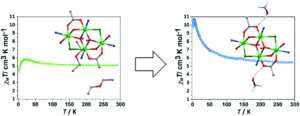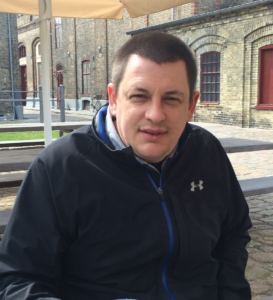Prof. Euan Brechin and Dalton Transactions
This year, we are celebrating the 50th volume of Dalton Transactions by taking a look at some of our authors who have published over 50 articles in the journal. This week we learn what Dalton Transactions means to Professor Euan Brechin.
Our author at a glance:
Professor Euan Brechin is based at the University of Edinburgh’s School of Chemistry, where his research is centered upon synthetic coordination chemistry and molecular magnetism. He chooses to publish in Dalton Transactions as he finds the journal showcases “the best contemporary general and inorganic chemistry from around the world”, and covers a diverse range of research across all areas of inorganic chemistry; from which he draws inspiration.
Please can you summarise your most recent research published in Dalton Transactions?
Our most recent work has focused on understanding, experimentally and theoretically, the magneto-structural relationships in a variety of 3d coordination compounds made with both flexible and rigid organic ligands.
How do you intend to expand upon your research in the future?
Current projects include constructing molecular iron oxides conforming to Platonic/Archimedean solids and/or mineral phases, exploiting host-guest chemistry to manipulate magnetic properties in 0-3D materials, and using supramolecular chemistry to build molecules for quantum information processing.
What would you say are the biggest barriers which need to be overcome to expand your research?
Lack of time to think, compounded by my inefficient use of that time and my stupidity. Sometimes the wheels turn slowly, and my moments of inspiration are fleeting. Beer helps, as does just sitting down and talking to people. Let’s hope we can get back to both soon. In terms of UK research in general, it’s funding and the way we fund. Other countries do it much better. We should be funding curiosity driven science based solely on quality, regardless of the individual, institution, field or cost. If governments and administrators have even a brief look through the history of science they will realise this is how major breakthroughs occur and long standing impact is created. We should not be pouring money down administratively driven, fashionable rabbit holes. Investment in infrastructure and diversity in science is as important as it is in every other walk of life.
You’ve published over 50 articles in Dalton Transactions: which of these works do you find to be most interesting/significant for our broad inorganic audience?
I’ve no idea! I always think my most interesting paper is the next one.
Outside of your own research, please suggest a Dalton Transactions article which you think has made a significant contribution to its field?
Tough, and unfair, to pick just one. The great thing about Dalton Transactions is the diversity of science it covers and the ideas I pick up from reading papers in seemingly unrelated fields. Finding the time to read journals is an increasingly difficult thing these days, but when I do it’s always fun and it always inspires me to try something new.
What advice do you have for young researchers new to your field?
Do the science you really want to do, the science that really excites you regardless of how niche you, or anybody else, may think it is. I think everyone does their best work when they love what they are doing. Papers and funding will follow. Stay positive, and don’t get disheartened when you get rejections. It happens to all of us all the time. The one in a hundred acceptance letter makes you forget the rejections.
What does Dalton Transactions mean to you?
As a UK scientist, RSC journals are always my first choice for publishing. Perhaps that’s a little sentimental but I think there should be a strong connection/bond between a national society and its scientists. That sense of community is undervalued, but I think it’s important and I hope it’s never lost.
Why do you choose to publish in Dalton Transactions?
I really like the journal and the breadth of science it contains, and I love being able to publish my science in a journal showcasing the best contemporary general and inorganic chemistry from around the world.
What is your experience of publishing with Dalton Transactions?
Almost always great, with a wee hiccup here and there (on both sides) – but that’s to be expected after 20 years of being an academic. The staff have always been professional. They have also been really friendly, personable and good fun. I shouldn’t name-drop, but Helen Lunn has been exceptionally helpful (and patient) over many years.
You can check out Euan’s most recent Dalton Transactions article on the structural manipulation of a series of Ni4 defective dicubanes below.
 The structural manipulation of a series of Ni4 defective dicubanes: Synthesis, X-ray Structures, Magnetic and Computational analyses
The structural manipulation of a series of Ni4 defective dicubanes: Synthesis, X-ray Structures, Magnetic and Computational analyses
Sidney S. Woodhouse, Tyson N. Dais, Emily H. Payne, Mukesh K. Singh, Euan K. Brechin and Paul G. Plieger*
Dalton Trans., 2021, 50, 5318-5326
Check out the full collection of recent research published in Dalton Transactions by all of our featured Golden Authors in our Celebrating our Golden Authors collection.











